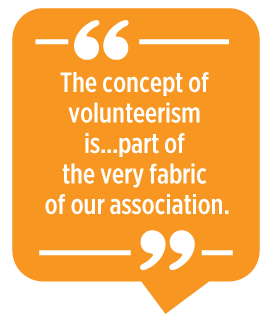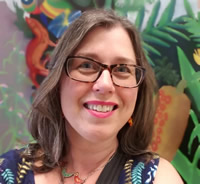From the President: Finding a Purpose Through Volunteerism and Partnerships
by Deborah J. Short
 Did you know that the U.S. Peace Corps was
founded 60 years ago today? On that day, 1 March 1961, a tradition of secular
volunteerism to serve overseas was institutionalized in the United States and
remains strong today. It also shapes us, TESOL, in several ways—a
good number of our members are former Peace Corps Volunteers, the U.S. Peace
Corps has been a partner in our work, and its approach to having a volunteer
become a full-fledged member of the community where assigned aligns with our
principles of knowing your learners and engaging and collaborating with
others.
Did you know that the U.S. Peace Corps was
founded 60 years ago today? On that day, 1 March 1961, a tradition of secular
volunteerism to serve overseas was institutionalized in the United States and
remains strong today. It also shapes us, TESOL, in several ways—a
good number of our members are former Peace Corps Volunteers, the U.S. Peace
Corps has been a partner in our work, and its approach to having a volunteer
become a full-fledged member of the community where assigned aligns with our
principles of knowing your learners and engaging and collaborating with
others.
Learning the
basics of the language and culture of a new country was at the core of the
training that Peace Corps offered volunteers then and continues to offer now.
How that teaching and learning process takes place has evolved over the years,
however, in large part due to researchers and practitioners who are part of our
English language teaching community. TESOL International Association is 55
years old now, founded in 1966, 5 years after the Peace Corps. The concept of
volunteerism is also part of the very fabric of our association.
An effective
organization has a clearly defined mission and the means to achieve it. Our
mission is the following:
TESOL
International Association advances the expertise of professionals who teach
English to speakers of other languages in multilingual contexts worldwide. We
accomplish this through professional learning, research, standards, and
advocacy.
We are
successful in this mission as a result of the hard work, knowledge, and
dedication of our volunteer members and our staff. We apply research on second
language learning, pedagogy, assessment, and cross-cultural communication to
our classrooms. We adhere to high-quality standards and levels of professionalism.
We maintain our unswerving advocacy for our learners, programs, schools, and
colleagues.
 We are all
familiar with the expression, “It takes a village to raise a child.” When you
work in the international education space, this message rings particularly
true. Successful organizations often partner with like-minded others to create
a cohesive, integrated approach within the multilingual contexts. We may work
in overlapping or complementary spaces, but when TESOL chooses a partner, we seek
one that shares our core values, including respect for “equity, diversity,
multilingualism, multiculturalism, and individuals’ language rights” and
integrity guided by “ethical and transparent action.”
We are all
familiar with the expression, “It takes a village to raise a child.” When you
work in the international education space, this message rings particularly
true. Successful organizations often partner with like-minded others to create
a cohesive, integrated approach within the multilingual contexts. We may work
in overlapping or complementary spaces, but when TESOL chooses a partner, we seek
one that shares our core values, including respect for “equity, diversity,
multilingualism, multiculturalism, and individuals’ language rights” and
integrity guided by “ethical and transparent action.”
Some of our
partners have opened new audiences to our association, like China
Daily 21st Century English Education Media, which holds the annual
TESOL Assembly for 1,000–2,000 English teachers in China, and ICPNA (El Instituto
Cultural Peruano Norteamericano), the binational center in Peru that sponsored
TESOL professional learning courses for more than 1,600 K–12 teachers over the
past 2 years. We currently work with American
Councils for International Education and the Department of
State in collaboration with Uzbekistan Ministry of
Education on a grant to improve the English language teaching skills of public school
teachers there, and recently we launched our TESOL
Core Certificate Program in India through the Regional
English Language Office of the U.S. Embassy and the Delhi Ministry of
Education. In all these cases, educators in these programs receive TESOL memberships,
too.
Other
partners bring new technologies and opportunities for us to grow as
professionals. VIPKid,
for example, brought online English language learning to young learners even
before the pandemic closed schools, and it has been exploring artificial
intelligence (AI) applications to language education. The TEAL
Charitable Foundation, an off-shoot of our affiliate in Canada, BC TEAL (The Association
of British Columbia Teachers of English as an Additional Language), presented a
webinar in February that offered ideas for fundraising for awards and
scholarships.
In some
cases, our members inform us about the work of groups that could be potential
partners in the future. Many in our Refugee
Concerns Interest Section, for example, connect with international
refugee service organizations, like UNHCR (United Nations
High Commissioner for Refugees) and IRC
(International Rescue Committee), as well as with resettlement agencies like
the Canadian Council for
Refugees, Hebrew
Immigration Aid Society, Ethiopian Community Development
Council, Swedish
Migration Agency, and others. These groups provide education and
health services in international camps before refugees transit to their new
homes in countries around the world and/or act as cultural informants for the
social service and school agencies in those new locations. TESOL’s Computer-Assisted
Language Learning Interest Section members have identified
educational technology groups that might also collaborate with us in the online
language learning space that is growing every day.
We entered
our profession, many of us, with a purpose in mind. We love language teaching
and exploring new cultures. We want to help others be successful in life. We
have a tradition of volunteering and seeking out partnerships. All of these
interests and attributes make TESOL strong. Let’s celebrate TESOL’s 55th
birthday and the U.S. Peace Corps’ 60th by continuing to engage and
serve.
Deborah J.
Short
Returned
Peace Corps Volunteer, DR Congo (formerly Zaire), 1981–1984
President,
TESOL International Association, 2020–2021
Deborah J. Short, PhD, is TESOL International Association president (2020–2021). She directs Academic Language Research & Training, LLC and provides professional development on academic literacy, content-based ESL, and sheltered instruction worldwide. She has led numerous research projects related to English learner education, codeveloped the SIOP Model, and served as series editor for several 6 Principles books.
TESOL Blogs
Interested in writing a blog for TESOL?
Read the submission guidelines and send us your post!
Check out some of the most recent TESOL Blogs:
|
6 Tips for Teaching Impromptu Speaking, by A. C. Kemp

ELs are often called on to speak extemporaneously in content classes. They might be asked to outline a scientific process, explain a literary term, or compare two historical events.
Having to speak without preparation can be stressful, even in your first language. Some students freeze; others dive in and start speaking without a plan and end up rambling. Trying to formulate thoughts and deliver them in a second language is an additional challenge.
However, your students can learn strategies to make answering impromptu questions easier. With a step-by-step plan and regular practice, you can help them gain confidence and master the skills to give clear, organized answers. Following are six tips for teaching impromptu speaking skills in your classroom. Read more. |
|
Gaming to Meet the TESOL Technology Standards, by Jeff Kuhn
 It has been a decade since the publication of the TESOL Technology Standards. Since then, the technology landscape has shifted, but the relevance of the standards remains. What keeps them relevant is their restraint. Instead of focusing on specific technology, the standards advocate for educators to adopt a mindset toward technology as a foundational part of their classroom practice and to pursue professional development that fosters technology integration. It has been a decade since the publication of the TESOL Technology Standards. Since then, the technology landscape has shifted, but the relevance of the standards remains. What keeps them relevant is their restraint. Instead of focusing on specific technology, the standards advocate for educators to adopt a mindset toward technology as a foundational part of their classroom practice and to pursue professional development that fosters technology integration.
In teacher training workshops over the years, I have frequently advocated for using video games to meet the TESOL Technology Standards, as the skills needed to use games effectively showcase competence in the Technology Standards. In this month’s blog post, let’s walk through how video games can help us meet the three standards of Goal 1 of the TESOL Technology Standards. Read more. |